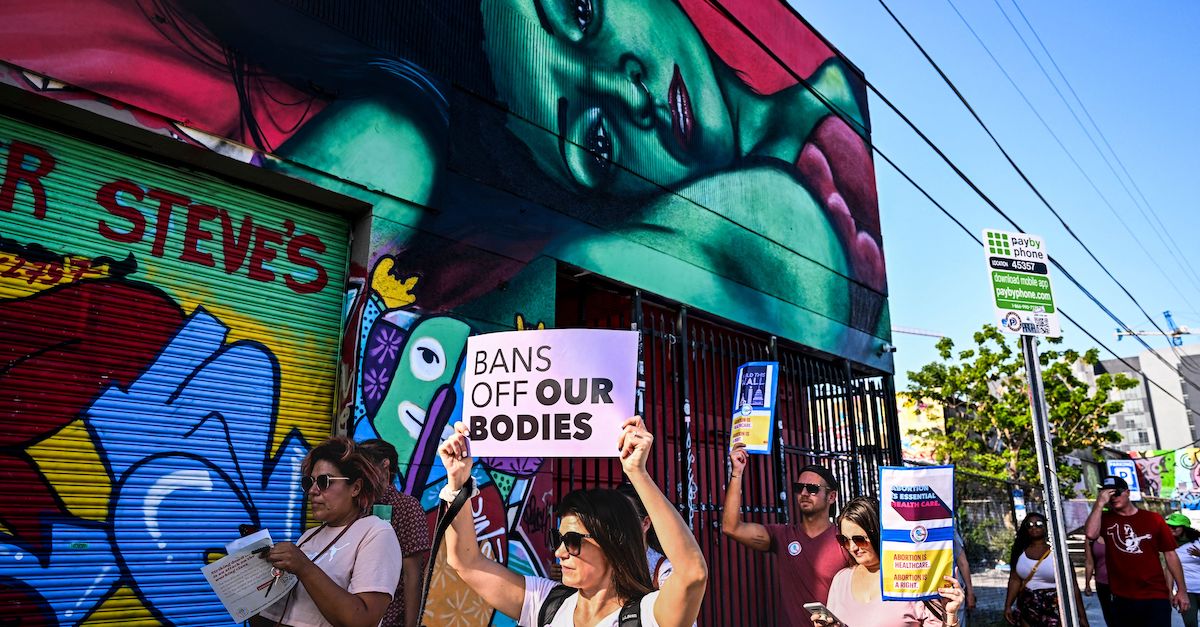
Abortion rights activists rally in Miami after the U.S. Supreme Court struck down the right to abortion on June 24, 2022.
Shortly after a Florida judge formally blocked a ban on abortions at 15 weeks, the state followed through on a promised appeal, automatically triggering a stay on the order. The ban now remains in effect until the appellate court rules on the case.
Planned Parenthood of Southwest and Central Florida led a coalition of six clinics and one physician in a lawsuit against the ban, which the Sunshine State’s legislature passed in March.
At the time of its passage, Vice President Kamala Harris issued a statement denouncing House Bill 5 as an “extreme” piece of legislation that would violate the landmark ruling Roe v. Wade, which enshrined a constitutional right to abortion access for nearly half a century since it was adopted in 1973.
In late June, the Supreme Court overturned that watershed precedent in Dobbs v. Jackson Women’s Health Organization. In nullifying Roe and its progeny Casey, the conservative majority demolished the constitutional foundations for constitutional abortion access in the United States.
“[The Roe court] held that the abortion right, which is not mentioned in the Constitution, is part of a right to privacy, which is also not mentioned,” Justice Samuel Alito wrote.
Florida Judge John C. Cooper, however, wrote that the state constitution made explicit what its federal counterpart did not.
“The right to privacy under the Florida Constitution is ‘much broader in scope’ than any privacy right under the United States Constitution,” Cooper wrote in a 68-page order granting a temporary injunction. “And in 2003, the Florida Supreme Court wrote, ‘any comparison between the federal and Florida rights of privacy is inapposite in light of the fact that there is no express federal right of privacy clause.'”
The so-called “privacy clause” of the Florida Constitution, Section 23, reads as follows:
Every natural person has the right to be let alone and free from governmental intrusion into the person’s private life except as otherwise provided herein. This section shall not be construed to limit the public’s right of access to public records and meetings as provided by law.
The judge signaled his intention to block Florida’s law last week at the end of an evidentiary hearing on the constitutionality of HB 5.
Some 30 minutes after Cooper issued his written order, the state filed its appeal, triggering an automatic stay on the ruling. That effectively reinstated a law that has been in effect since July 1.
The clinics’ attorneys at the American Civil Liberties Union, ACLU of Florida, Center for Reproductive Rights, Planned Parenthood Federation of America, and the law firm Jenner & Block wrote in a statement that the toll of the ban has been immediate.
“Florida’s 15-week ban has already blocked access to essential abortion care since last Friday, and it will continue to harm pregnant people until it is blocked,” they wrote. “The trial court correctly recognized this law as a blatant violation of Floridians’ state constitutional rights, and we’re determined to get it blocked for good. The majority of people support the right to get essential abortion care in Florida—a right many have relied on for decades to secure the life they wanted for themselves and their families.”
The judge’s ruling notes that roughly 6.1 percent of abortions in Florida took place in the second trimester in 2021.
Judge Cooper also noted that the Florida Supreme Court has upheld right to an abortion rooted in privacy rights.
“The Florida Supreme Court has held that the Privacy Clause guarantees women the right to abortion prior to viability,” his ruling states. “Striking down a law that restricted minors’ access to abortion in In re T.W., the Supreme Court explained that the Privacy Clause ‘is clearly implicated in a woman’s decision of whether or not to continue her pregnancy.'”
“It is our office’s responsibility to defend duly enacted state statutes and we will continue to do so,” said Kylie Mason, a spokesperson for the Florida Attorney General’s Office, in response to a request for comment by Law&Crime.
Read the judge’s order below:
(Photo by CHANDAN KHANNA/AFP via Getty Images)